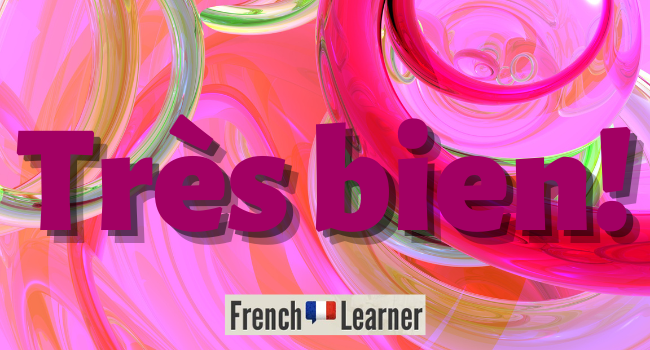If you are new to learning French or are advanced, you’ve surely come across the adverb and expression très bien. But, what does très bien really mean? In a nutshell, très bien translates to “very well”, “good!” and “very good!”. This post will explain precisely how to use très bien in a wide variety of sentences.
très bien – [tʀɛ bjɛ̃]
very well / very good

Très bien pronunciation
In this section we will take a quick look at how to pronounce très bien. The word très means very and is pronounced somewhere between “tray” as in cafeteria tray and “treh” with “eh” sounding like the -e in get.
très
The word bien means “well”. The phonetic symbols for bien are “bjɛ̃”. Essentially, the pronunciation is “bee” plus the nasal -in as in the verb inviter (to invite). The -en in bien is not pronounced like the nasal -en or -an as in the words enfant (child) and pendant (during).
bien
The single most important aspect to pronouncing très bien correctly is not pronouncing the final -n on bien. If you pronounce the -n, you’re not speaking French!
Très bien in greetings and how to reply
One of the most common uses of très bien is in French greetings. In these situations, the direct translation is “very well”. Another translations of très bien are are “Great!”, “Well!”, “Good!” and “Very good!”.
There are several ways to ask somebody how they’re doing. You can say: Comment allez-vous? (How are you? formal), Comment vas-tu? (How are you? informal), Ça va? (How’s it going? somewhat informal) and Comment ça va? (How it going? somewhat informal).
To answer any question asking how you’re doing, you can also answer by simply saying, “Très bien !”. You can also respond, “Je vais très bien, merci”, which translates to “I am doing very well, thank you”.
Je vais très bien, merci.
I am doing very well, thank you.
Equally, you can respond, “Ça va très bien, merci”, which means “I am very well, thank you”.
Ça va très bien, merci.
I am very well, thank you.
Using très bien as an adverb
Present tense sentences
There are many ways to use très bien when building sentences. The most basic usage is to modify a verb. For example, “Je chante très bien” (I sing very well) or “Vous cuisinez très bien” (You cook very well).
Je chante très bien.
I sing very well.
In situations where the sentence has a direct object, très bien must come between the verb and the direct object.
For example, “Je chante très bien la chanson” (I sing the song very well) or “Vous cuisinez très bien les pâtes.” (You cook pasta very well).
Je chante très bien la chanson.
I sing the song very well.
How to use très bien in the passé composé
In the passé composé (a French past tense), très bien comes between the auxiliary (helping) verb and the past participle.
For example, “J’ai très bien chanté” (I sang very well). Putting très bien at the end of the sentence would be wrong. Hence, you cannot say “J’ai chanté très bien”.
J’ai très bien chanté.
I sang very well.
Très bien in spoken French
Très bien has several other common usages in French.
1. Easily, just as well
In some situations, très bien translates to “easily” or “just as well”. For example
- On peut très bien utiliser le parmesan aussi. We can just as well use parmesan cheese.
2. Great! Excellent!
Très bien can also mean “Great!” or “Excellent!” when expressing agreement. For example:
- Très bien! On recommencera demain ! Great! We’ll start again tomorrow!
3. That’s fine! That’s great!
The expression “c’est très bien !” translates to “That’s fine!” and “That’s great!”. For example:
- C’est très bien! On vient vous chercher à l’aéroport. That’s fine! We’ll come to pick you up at the airport.
4. Ok, okay
Très bien can also mean “OK” or “okay”. For example:
- Très bien ! On commence ! Okay, let’s begin!
5. Fully, very well
Another meaning of très bien is “fully”. For example:
- Merci. C’était delicieux ! J’ai très bien mangé ! Thank you. It was delicious. I eat very well!
6. To know very well
Another common usage of très bien is associated with the verb savoir (to know). In this situation, savoir très bien can mean “to know fully well” or “to be fully aware”.
For example, “Je sais très bien sa réponse.” can translate to “I know full well his answer” or “I am fully aware of his answer”.
7. Academics
Très bien can also be added to the results of the French high school baccalaureate exam to highlight distinction. Thus, “baccalauréat mention très bien” means passing the baccalaureate with a grade higher than 80%.

Related lessons

